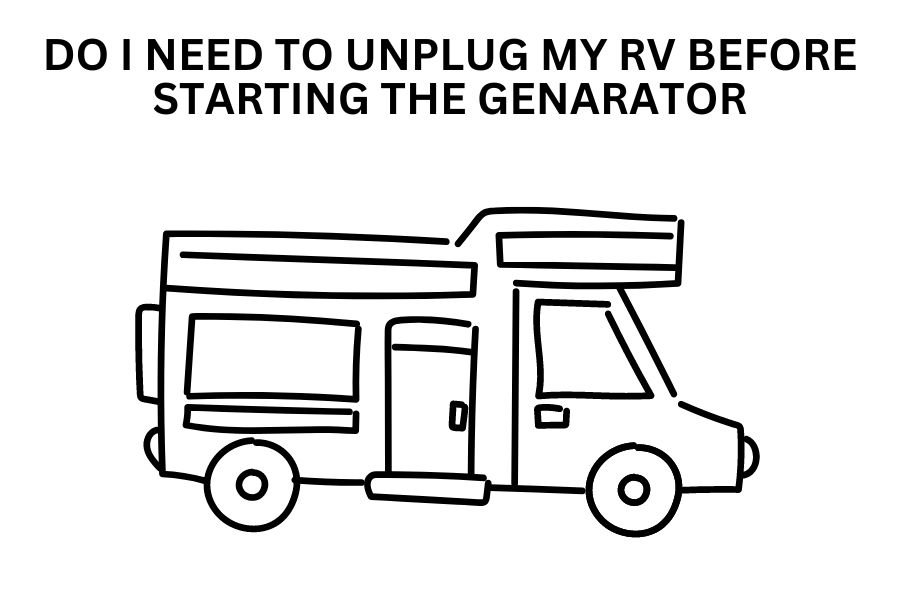Starting your RV’s generator might seem like a simple task, but there’s a crucial question that many RV owners overlook: should you unplug before starting it? Making the wrong move could lead to electrical damage, system overloads, or other safety hazards. In this guide, we’ll walk you through why unplugging matters, how to do it properly, and how to keep your RV’s electrical system running smoothly—so you can focus on enjoying the adventure ahead without worry.
Table of Contents
Why is knowing about this question crucial for the Safety and Functionality of an RV?
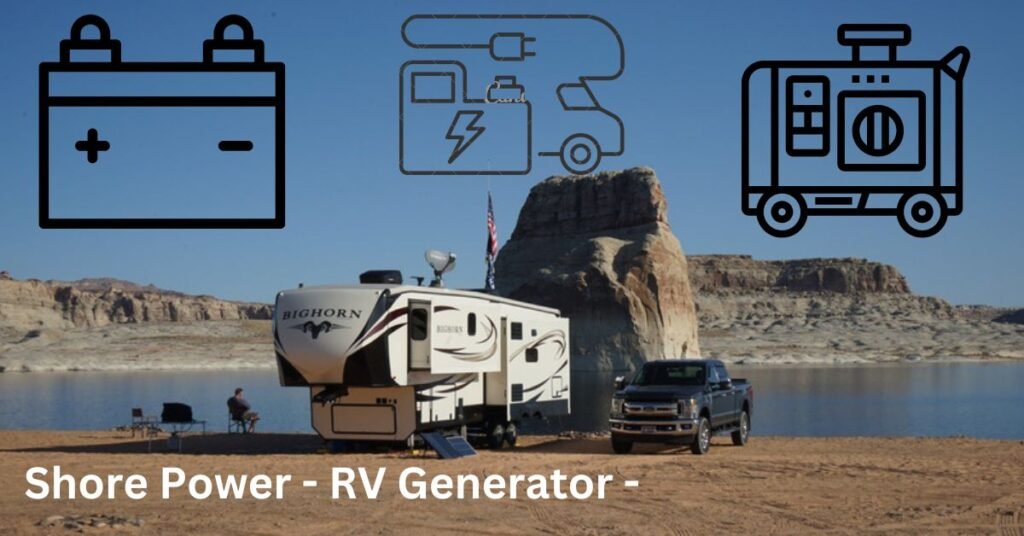
Knowing the answer to this question isn’t just a matter of technical knowledge—it’s about safeguarding your camper, ensuring peace of mind, and even guaranteeing your personal safety.
Picture this: you’re out in the middle of nowhere, surrounded by nature, and are miles away from the nearest help. Your RV is your asylum and lifeline. The last thing you want is to accidentally damage its electrical system and put yourself in a dangerous situation because of something as simple as starting a generator without unplugging it first.
Understanding whether you need to unplug before firing up that generator can mean the difference between a smooth, worry-free trip and a costly, frustrating disaster. It’s about ensuring that when you’re out there, you’re not just enjoying the freedom of the open road, but doing so with the confidence that everything is working as it should. And honestly, who doesn’t want that kind of peace of mind?
It’s one of those small things that can have a big impact, and knowing it could save you from a whole lot of headaches down the line. Plus, it’s one less thing to stress about when you should be focusing on the adventure ahead.
Is it necessary to unplug the RV before starting the generator? Yes or No.
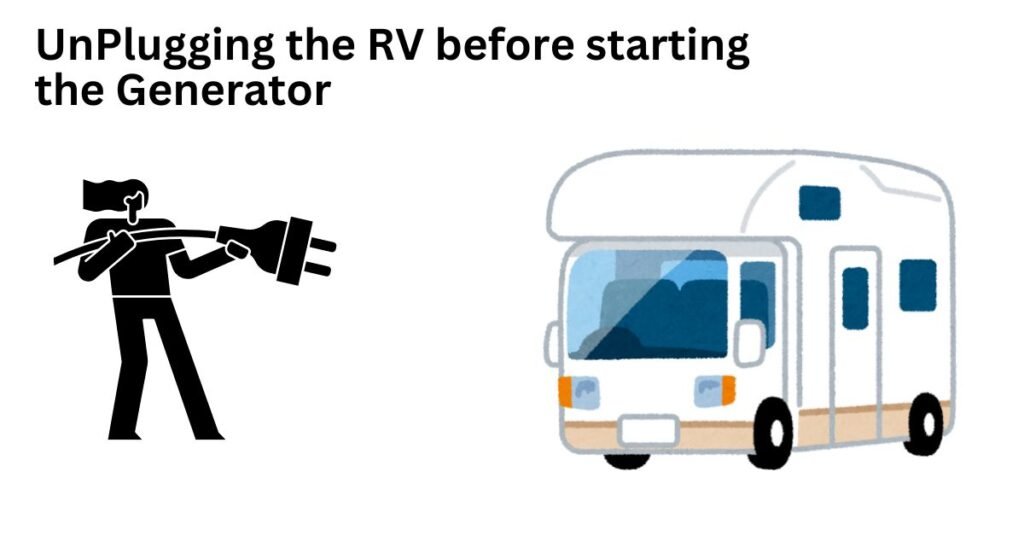
Yes, it is compulsory to disconnect the RV before starting the generator.
But I know you’re looking for more than just a one-word answer.
Unplugging your RV before starting the generator is crucial because it prevents potential electrical issues, like surges or overloads that could damage your appliances or the RV’s electrical system. It’s a simple step, but it can save you from a world of trouble. So, while the answer is “yes,” it’s all about protecting your RV and ensuring everything runs smoothly during your trip.
How long can an RV run without being plugged in?
How long your RV can run without being plugged in depends on several factors, like your van battery capacity, how much power you’re using, and the efficiency of your RV’s systems. If you’re running just the essentials—like lights, water pump, and maybe a few small devices—your RV could last anywhere from a day to a few days on battery power alone.
However, if you’re using energy-hungry appliances like the air conditioner or microwave, that time will be much shorter. It’s all about how much power you’re drawing from the batteries. Solar panels, if you have them, can extend this time by recharging your batteries during the day. But at some point, you’ll either need to plug in, fire up the generator, or manage your power usage very carefully to keep things running smoothly.
So, while the answer can vary, with careful planning and conservative power use, you can stretch your off-grid time to suit your needs.
Probable Risks when you don’t Unplug the RV
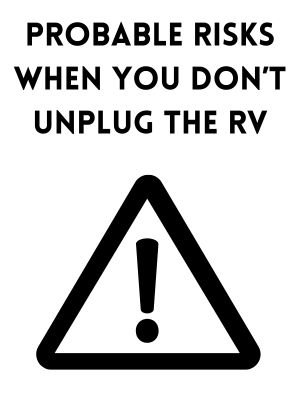
The risks of not unplugging your RV before starting the generator are real, and the probability of encountering them isn’t something to take lightly. Let’s break it down.
Potential for Electrical Damage
First, there’s the risk of electrical surges. When you start the generator without unplugging from shore power, there’s a chance that both power sources could momentarily feed electricity into your RV’s system at the same time. This can create a flow that might completely fry your electronics or appliances. The probability of this happening depends on the quality of your trailer’s electrical system and whether it has a transfer switch, but it’s not a risk worth taking.
Overloading the System
Next, there’s the possibility of overloading the system. Your RV’s electrical setup is designed to handle one power source at a time. If both the generator and shore power are connected, it could overload the circuits, leading to blown fuses, tripped breakers, or even damage to the wiring.
Again, while this might not happen every time, the odds increase the more often you start the generator without unplugging.
Safety Concerns
Finally, there’s the safety aspect. Electrical malfunctions can cause sparks or short circuits, which could potentially lead to fires. While the probability of a fire is lower, the consequences are so severe that it’s not worth the risk.
In short, the probability of these risks might differ, but the potential consequences are serious enough that unplugging should always be part of your routine. It’s a simple step that can prevent a lot of headaches and keep you, your RV, and your trip safe.
When to Unplug the Generator
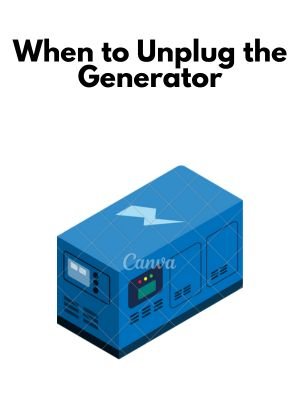
Knowing when to unplug the generator is key to keeping everything running smoothly and safely in your motor caravan. The rule of thumb is simple: whenever you’re switching power sources, whether it’s from shore power to the generator or vice versa, you should unplug.
So, when should you unplug the generator? Here’s a quick guide:
Before Plugging into Shore Power
If you’re arriving at a campsite and you’ve been using the generator while driving or while boondocking, make sure to turn off and unplug the generator before connecting to Shore Power. This ensures a smooth transition and prevents any overlap of power sources, which could cause rushes or overloads.
Before Starting the Generator
If you’re about to start the generator because you’re leaving a campsite or need to switch from shore power to generator power, don’t forget to unplug from the shore power first. This step protects your RV’s electrical system from potential damage.
During Maintenance
If you’re doing any maintenance on your RV’s electrical system or the generator itself, always make sure it’s unplugged. Safety first!
When Powering Down: Finally, when you’re done using the generator and ready to power down, it’s a good habit to unplug it. This helps avoid any accidental power flow and keeps your systems in check.
In essence, anytime you’re switching power sources or performing any type of maintenance, disconnecting the generator is a must thing. It’s a simple habit that ensures your RV stays safe and sound.
FAQs
Can I start my RV while plugged into shore power?
Yes, you can start your recreational vehicle while plugged into shore power, but it’s important to be careful. Just be aware that running certain systems, like your air conditioner, while starting the RV can put pressure on the electrical system, which is of course not good for your trailer machinery. So, it’s generally safer to unplug the RV first, start it up, and then reconnect to shore power if needed.
Can I run my camper van generator while plugged into shore power?
No, you shouldn’t run your trailer generator and the shore power at the same time because it can create a conflict between the two power sources which can potentially damage your RV’s electrical system. It’s always best to unplug from shore power before starting the generator to avoid any issues.
Is it OK to leave my RV plugged in all the time?
Yes, leaving the RV plugged in all the time doesn’t have any hazards but it is important to consider a few things. As you may also know constantly charging the battery can lead to overcharging and cause it to wear out earlier. To avoid overcharging the battery and minimizing the chances of exploding, it’s a good idea to monitor the battery levels or use a battery maintainer to keep things balanced.
Is it safe to start the generator while appliances are running in the RV?
It’s generally safe to start the generator while some appliances are running in your motor home, but it will build load on the electrical circle of the RV. Starting the generator with heavy appliances, like the air conditioner, which is already running, can drain the system. So, it’s a good idea to turn off the high-power devices before starting the generator and then gradually turn them back on once the generator is up and running.
How often should I run my caravan generator to keep it in Good condition?
To keep your RV generator in good condition, it’s recommended to run it for about 1-2 hours every month, even when you’re not on the road or on any outdoor adventure.This helps keep the engine parts lubricated, prevents fuel from going stale, and ensures everything stays in working order. Regular exercise is key to avoiding issues down the road.
Conclusion
In the end, knowing whether to unplug your RV before starting the generator isn’t just a small detail—it’s a key step in protecting your RV’s electrical system and ensuring your trip goes off without a hitch. By following these simple steps, you’ll avoid potential damage, reduce safety risks, and keep everything running smoothly. Remember, it’s all about taking the right precautions so you can enjoy your journey with peace of mind, knowing your RV is in good hands. Safe travels!

